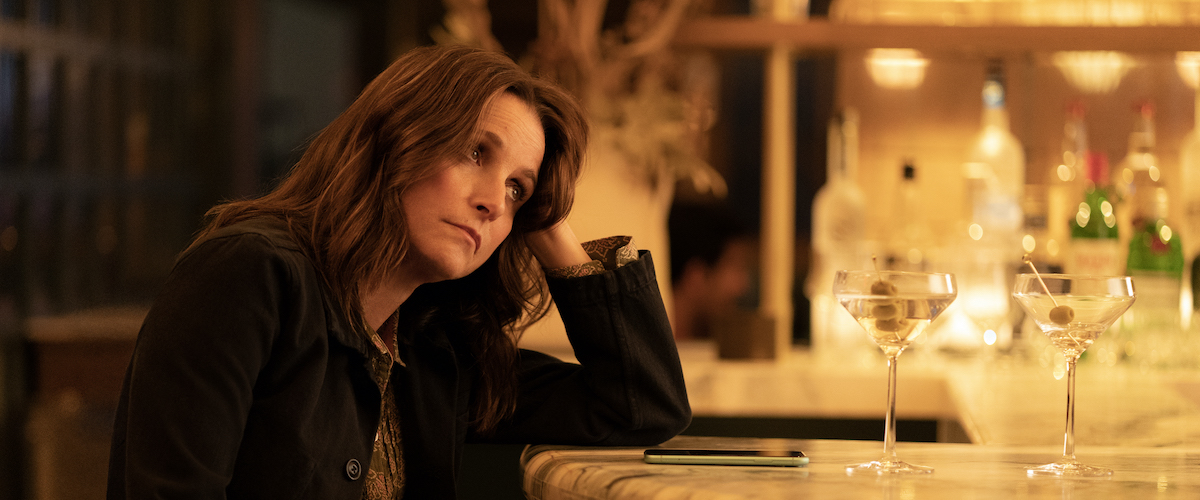
Sometimes it’s the people we’re closest to who can annoy us the most. It’s hard to exactly say why—maybe it’s because they remind us of the worst aspects of ourselves. Maybe it’s because we feel so safe in their company, we allow ourselves to be irritated by minor things, confident that they’ll never abandon us. Or maybe it’s because their opinion matters so much to us, we can’t help but to put unsustainable weight on everything they say.
In Nicole Holofcener’s sharply observed You Hurt My Feelings, we see many close relationships, mostly in various states of irritation.
Don (Tobias Menzies) is a psychiatrist, who treats both couples and individuals. One couple (real life married couple David Cross and Amber Tamblyn) are so permanently annoyed by each other, neither can do right. He never looks at her when she talks. She points at him too much. He maintains that she makes him salads for lunch, not because she loves him (as she insists) but as a passive aggressive way of suggesting he should lose weight.
Another patient (Zach Cherry) seems perpetually annoyed with, well, Don. “F**king pointless,” he mutters after one therapy session. (Don overhears him; maybe he’s supposed to.) “What an idiot,” he says under his breath after another.
Don is actually in a very happy marriage to his writer wife, Beth (Julia Louis-Dreyfus). In fact, their marriage is so simpatico it bugs their 23-year-old son, Eliot (Owen Teague). Must they always share their food like that? Can’t they order separately? Ugh.
Meanwhile, Beth gets annoyed at her mother (Jeannie Berllin) when she suggests that Beth’s agent botched the rollout of her last book. It’s meant to be a kind statement, an explanation for why the book, a memoir, didn’t perform well. But it ticks Beth off. “How does that help me?” she grouses.
Beth is close to her sister, Sarah (Michaela Watkins), who is in a pretty good relationship with her actor husband, Mark (Arian Moayed). Nonetheless, he has some habits that irk her—a strange obsession with socks, a tendency to wallow in self-pity.
The film’s central conflict, such as it were, comes when Beth overhears Don telling Mark that he doesn’t like her latest book. It comes at a particularly awkward time for Beth. It’s not just that the memoir underperformed. Her publisher thinks the new book needs a rewrite. Don had been encouraging her all along—telling her the book was great. His words, his approbation, meant a lot to her. And now she finds out he’s been lying to her.
But of course, he’s not actually lying. At the most it’s a white lie—which we all tell every day. To love someone is to tell white lies, Holofcener observes. Sarah tells Mark that she thinks he’s a good actor, when she isn’t really so sure. Beth tells Don that she likes the earrings he has bought her for their anniversary. When Eliot was young, Beth told him he was a great swimmer, even though he wasn’t. (Maybe she believed he was a great swimmer—we are about as objective about our children as we are about ourselves.)
But Beth is deeply hurt by this and it affects their relationship. And that’s the crux of the film.
It’s wonderful to watch these great actors living out this minor (to us), but major (to them) crisis. Louis-Dreyfus, to her credit, leans into Beth’s narcissism. (At a bookstore, Beth takes her own book and lays it out on the display table over that of a rival author’s.) But Louis-Dreyfus has never been afraid to play prickly characters—we love and root for Beth despite her flaws because she is such a fully fleshed out and relatable human. Meanwhile, Don is going through a bit of a crisis of his own. He can’t stand the bags under his eyes; he thinks they make him look old and permanently tired. He feels that he’s lost his edge at work—is he even helping his patients at all? He would turn to Beth normally at a time like this, but she’s just so…annoyed by him. And Menzies plays this all with just the right amount of rueful befuddlement.
Will Don and Beth overcome this setback in their marriage? Will Beth come to realize that Don lied because he loves her? Holofcener’s film has us reflecting on our own relationships and the white lies we tell, the permission we give ourselves to be annoyed and irrationally hurt by the people we love the most. It doesn’t make us bad people. It just makes us people.
